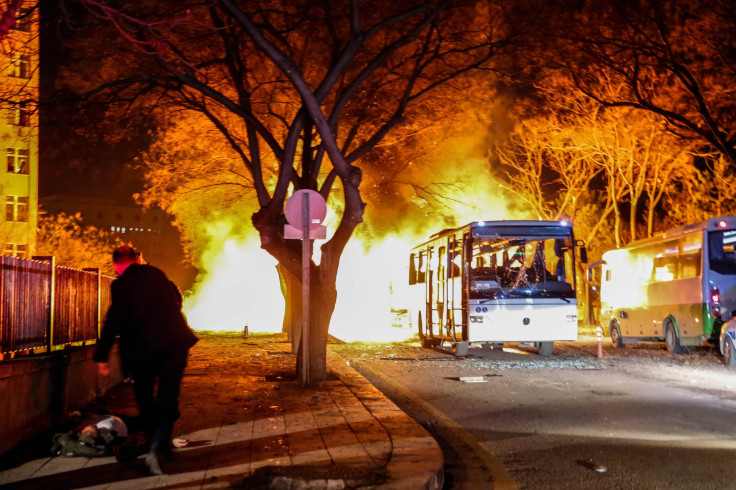Who Is Salih Necar? Syrian National Tied To Kurdish Rebels Involved In Ankara Attack, Turkish PM Says

UPDATE: 5:58 a.m. EST— Turkish Prime Minister Recep Tayyip Erdoğan said Thursday that despite denials, evidence gathered by the country's officials indicates that Syrian Kurdish militants were involved in the Ankara blast, the Associated Press reported.
Erdoğan added that Wednesday’s attack in the capital that left 28 people dead would highlight to the international community the strong links that exist between the Turkish rebel group PKK and the Syrian Kurdish militia groups.
UPDATE: 5:36 a.m. EST — Turkish President Recep Tayyip Erdoğan said Thursday that 14 people were detained in connection to Wednesday’s Ankara blast that claimed lives of 28 people, Reuters reported.
Original story:
Turkish Prime Minister Ahmet Davutoğlu confirmed local media reports Thursday that a Syrian national associated with the country’s Kurdish rebels carried out Wednesday’s Ankara blast that left 28 people dead, according to reports. He added that nine suspects have been arrested over the incident.
"The attack was carried out by the PKK [rebel Kurdistan Workers' Party] together with a person who sneaked into Turkey from Syria," Davutoğlu said, according to the Associated Press. Davutoğlu added that his country will retaliate against the Kurdish rebels, the AP reported.
On Thursday, pro-government Turkish daily Yeni Safak reported that a Syrian national, who was identified from his fingerprints, was the alleged Ankara bomber, according to Reuters. The suspect was identified as Salih Necar and was believed to have entered Turkey along with Syrian refugees. His fingerprints were reportedly taken when he entered the country. The newspaper report stated that the car used in the blast was rented out in the western Turkish city of Izmir about two weeks back.
Salih Muslim, the leader of the main Syrian Kurdish group, has denied claims that his group is responsible for the Ankara attack and warned that Kurdish and Arab fighters will confront Turkey's ground action in Syria, the AP reported. He reportedly dismissed Turkey's allegations and noted that the blast bears resemblance to attacks by the Islamic State group, also known as ISIS.
"We have no link to these bombings and with what is happening inside Turkey," he told the AP.
Also on Thursday, Cemil Bayik, the top member of PKK said he was not aware who carried out the attack but noted that the blast could be in retaliation for "massacres in Kurdistan," a Kurdish news agency reported. "We don't know who did this. But it could be an act of retaliation for the massacres in Kurdistan," Bayik told Firat News Agency, according to Reuters.
Following the blast, Turkish President Recep Tayyip Erdoğan vowed to avenge the deadly attack. Erdoğan said the bombing went beyond all "moral and humane boundaries."
"Turkey will not shy away from using its right to self-defense at any time, any place or any occasion," Erdoğan reportedly said.
© Copyright IBTimes 2025. All rights reserved.





















